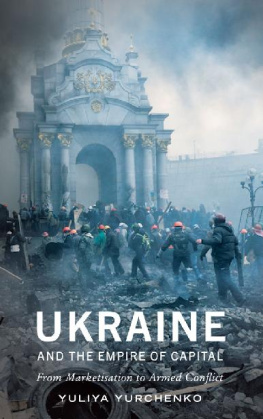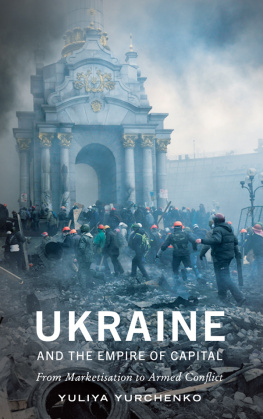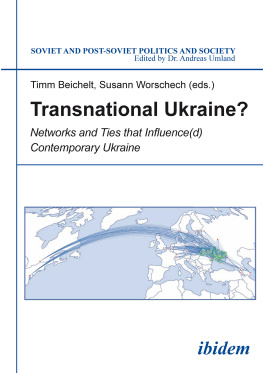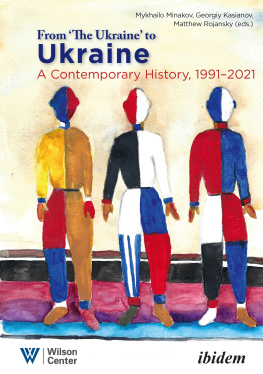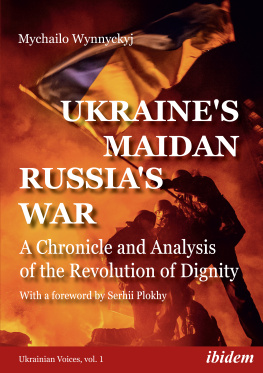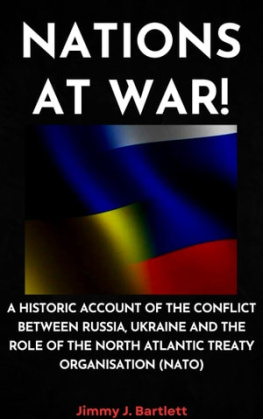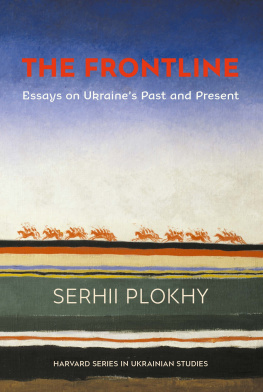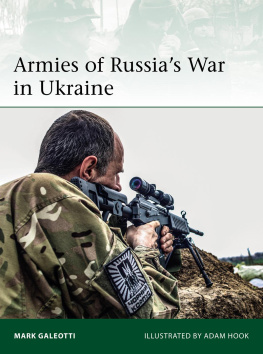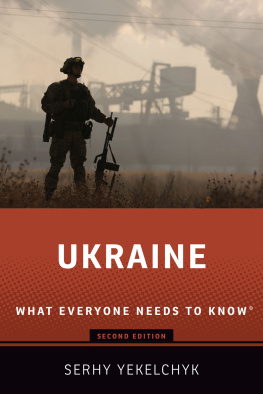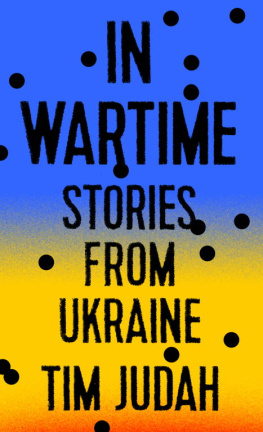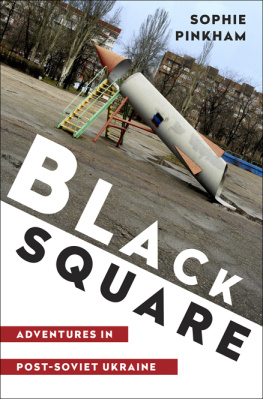Ukraine and the Empire of Capital
Ukraine and the Empire of Capital
From Marketisation to Armed Conflict
Yuliya Yurchenko

First published 2018 by Pluto Press
345 Archway Road, London N6 5AA
www.plutobooks.com
Copyright Yuliya Yurchenko 2018
The right of Yuliya Yurchenko to be identified as the author of this work has been asserted by her in accordance with the Copyright, Designs and Patents Act 1988.
British Library Cataloguing in Publication Data
A catalogue record for this book is available from the British Library
ISBN 978 0 7453 3738 8 Hardback
ISBN 978 0 7453 3737 1 Paperback
ISBN 978 1 7868 0181 4 PDF eBook
ISBN 978 1 7868 0183 8 Kindle eBook
ISBN 978 1 7868 0182 1 EPUB eBook
This book is printed on paper suitable for recycling and made from fully managed and sustained forest sources. Logging, pulping and manufacturing processes are expected to conform to the environmental standards of the country of origin.
Typeset by Stanford DTP Services, Northampton, England Simultaneously printed in the United Kingdom and United States of America
To the victims of capital
Contents
Figures and Tables
FIGURES
TABLES
Abbreviations
ACC | American Chamber of Commerce |
CIS | Commonwealth of Independent States |
CPSU | Communist Party of the Soviet Union |
CSTO | Collective Security Treaty Organization |
CUSUR | Centre for USUkraine Relations |
DCFTA | Deep and Comprehensive Free Trade Areas |
EBA | European Business Association |
EBRD | European Bank for Reconstruction and Development |
ERT | European Round Table of Industrialists |
ETG | Eural Trans Gas |
FDI | Foreign direct investment |
FIGs | Financial industrial groups |
ICC | International Chamber of Commerce |
IFIs | international financial institutions |
IMF | International Monetary Fund ISD Industrial Union of Donbass ( ) |
JSCs | Joint Stock Companies |
KIIS | Kyiv International Institute of Sociology |
Maidan | Maidan Nezalezhnosti (Independence Square), the main square of Kiev |
maidan | social movements associated with the Orange Revolution and the Bloody winter |
NDP | (Narodno-Democratychna Party) Peoples Democratic Party |
NRU | (Narodnyy Rukh Ukrayiny) Peoples Movement of Ukraine |
PDAs | Priority Development Areas |
PIIGS | Portugal, Italy, Ireland, Greece and Spain |
SALs | Structural adjustment loans |
SAPs | Structural adjustment programmes |
SCM | System Capital Management |
SDPU(U) | Social-Democratic Party (United) |
SEZs | Special Economic Zones |
SOEs | State-owned enterprises |
SSR | Soviet Socialist Republic |
UAH | Ukrainian Hryvnia the currency of Ukraine |
URPP | Ukrainian Union of Industrialist and Entrepreneurs |
USUBC | USUkraine Business Council |
WB | World Bank |
WIDER | The World Institute for Development Economic Research |
WTO | World Trade Organization |
YeESU | United Energy Systems of Ukraine (Yedyni Energetychni Systemy Ukrayiny) |
YES | Yalta European Strategy |
Acknowledgements
All those who helped or hindered in getting this book done over the years you know who you are and what role you played in the process. If I have not thanked you yet in person, it is only because there has not yet been an opportunity to do so. Thank you to those who helped for your support, I am eternally grateful and humbled for having you in my life and for knowing you exist. And those who hindered, thank you too; without you I would not know the stretch of the limits of my own possible.
I want to thank the production team at Pluto and particularly my editor, David Shulman, for his continuous support and encouragement to tell the story I wanted to tell yet which was at first hidden behind the formalised structures I thought I had to follow yet always disliked. I am thankful to the reviewers of the book proposal and the text sample whose comments gave me ideas about improving the narrative. All the shortcomings of the final result are solely mine.
Preface
In 2004 I came to Sussex, UK, as an aspiring interpreter, willing to work in the sphere of politics to assist understanding between the leaders of the world, obviously full of naivet and boundless ambition. It seemed to me then that I could use my love of languages as contribution to address the unfairness and injustice in the world, and there was no shortage of those. I was politically apathetic, defeated, in a state of self-imposed intellectual coma that I felt was necessary to survive the lawlessness and civic impotence Id experienced growing up in Kuchmas Ukraine. I saw miners on hunger strike in tents in central Kyiv being fenced off so a Christmas tree could be put up and their discomforting sight would not bring down the spirit of the festive crowd. I heard a university lecturer reply to my complaining about this with her approval of the city administrations actions. My uni friends and I were taken out of classes on a few occasions to take part in pro-president demonstrations by orders from above, our lecturers being asked to oversee us go. We didnt go, we got lost en route to the demos, then we got into trouble with our department and that was also later reflected in our grades. All state institutions were subject to such pressure and demands to show loyalty or else...
In 2004, the year of the Orange Revolution, I came to Sussex where an introduction to the inspiring faculty and IR scholarship motivated me to dig deeper, seek more, demand empirics. The Orange Revolution that started and pathetically failed soon after left me full of frustrations but also hope that things can change; people can rise, en masse. I had thoughts I needed to express in my own words, not in words translated by me; I needed to find a language, a framework that would help explain what precisely is going so wrong. Political economy gave me that language and the necessary analytical tools.
Some ten years after the start of that journey to piece together the jigsaw of Ukraines metamorphosis, the book has finally been shaped. The deep recession in which I envisaged the country would stagnate now also is tarnished by a hybrid civil armed conflict with a foreign element. Few expected this to happen in twenty-first-century Europe; mainly because too many forgot that the most resilient empire in modern history has not fallen with the fading of the European empires but has grown stronger the empire of (transnationalising) capital. And where empires spread, blood is shed. Blood has been shed continuously across the globe in the name of struggles for further accumulation of capital. Until only recently it soaked the fringes, sprinkled the frontiers of empire; hidden away from the eyes of the gentrified Europeans in the piazzas lit by now solar-powered, sustainable lights. Frontiers however have a historically documented quality they shift and shrink as empires expand. And as they do, they absorb the remaining commons and first Thomas Moores sheep and by now private capital/TNCs/legal persons eat physical persons. By privatising state- and municipality-owned assets, by privatising public services, by polluting the global environmental commons, by making the taxpayer accountable for corporate losses via austerity and international settlement mechanisms... the masters enclose. The dispossessed are left in that process to scrabble for crumbs and to hate those who scrabble next to them because the machine of capital that pauperised them is both too big to comprehend and to challenge; too invisible as a whole for its size.
Next page
